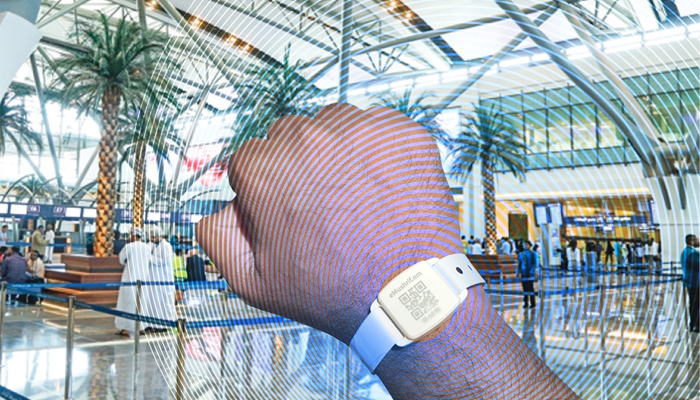

Muscat: People caught violating home and institutional quarantine while wearing the tracking bracelet can be traced through a number of means, should they break their isolation rules.
eMushrif, the company that makes and supplies the tracking bracelets issued by the Ministry of Health to locals and expatriates who are required to self-isolate during the COVID-19 pandemic, says it coordinates with the ministry and Royal Oman Police to track those accused of breaking quarantine.
“Each tracking bracelet contains a unique eight-digit code, through which we can track those who have violated home or institutional quarantine,” said Haitham Al Shukaili of the public relations department at eMushrif.
Users of the Tarassud COVID-19 monitoring app can see wearers of these tracking bracelets near their current location. Selecting the icon that depicts each user on the app will reveal his eight digit code.
“When a person takes a screenshot of his code and sends it to us via the numbers made available for them to file a report, we verify the bracelet wearer’s data using the same number,” added Al Shukaili.
“This is done in collaboration with the Ministry of Health, through which we can verify whether the person in question really has violated quarantine.”
“We then send this to the ROP in case they need to take action,” he added.
“We find out the whereabouts of the violator with the help of the person who sent us the screenshot, by tracking his location through his phone.”
However, Al Shukaili added that teams from eMushrif first verify whether the person has genuinely broken quarantine. All reports of quarantine violations are first sent to the company’s communications centre before action is taken.
“Sometimes, there are genuine, convincing reasons for people to break quarantine,” he admitted. “He might be forced to go to the hospital in case of an emergency.
“We first communicate with the quarantined individual to verify this, and once we have confirmed he has indeed violated quarantine, we transfer his details to the Royal Oman Police so that they can take action,” said Al Shukaili.
Oman’s efforts to curb the spread of COVID-19 have received praise from the World Health Organization (WHO) for being among the best in the Middle East. With people entering the country now required to enter institutional isolation for seven days on arrival, eMushrif is setting up a new system to make it easy for them to book hotels in which they can spend their quarantine period.
Called Sahala (Arabic for ‘simple’ or ‘easy’), the setup will also enable e-Mushrif and the concerned government authorities make sure people are following the rules related to institutional quarantine.
“We realised that there were some people who came into the country with fake hotel bookings, so that they could avoid institutional quarantine,” said Al Shukaili.
“We will be launching this new service at noon on Thursday, March 4, so that travellers who pre-book through this platform can be monitored from the time they enter the country until their isolation period is over.”
“There are between two and three thousand passengers arriving in Oman every day, which means there are around 15,000 people who are subjected to institutional quarantine on a weekly basis,” he added.
“The decision to bring in institutional quarantine has yielded positive results, despite there being a few problems when this first came into effect.”